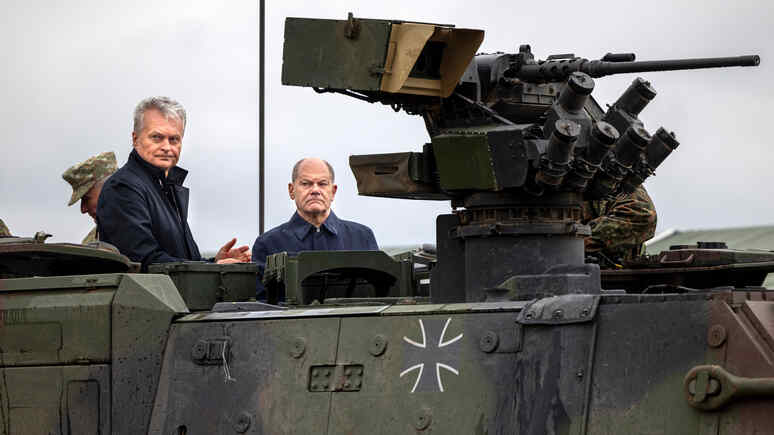Photos of Scholz on a tank in Lithuania, although “grotesque”, show the seriousness of the German attitude towards NATO and confronting Russia, says Der Spiegel. But the visit to Lithuania was not only symbolic. It was important for Scholz to discuss the issue of financing the Bundeswehr base in Lithuania. Berlin expects Vilnius to take this issue on board. Lithuanian President Nauseda has promised to be “generous”, but as the publication notes key issues of barracks quality have yet to be discussed.
The German magazine Der Spiegel believes that the photos from the official programme of Scholz’s visit to Lithuania are, on the one hand, “grotesque” because “Olaf Scholz is a man of not too tall stature” and looks out of place on a powerful Boxer TBM. But on the other hand, they are “powerful” because they definitively show the change in German politics. “These pictures would have been unthinkable just two and a half years ago,” but now “were obviously welcome, intended.” Germany has undergone a “change of era”, with the Bundeswehr being allocated €100bn, the country discussing the return of a conscript army, and the chancellor defiantly travelling to the Baltics instead of meeting Xi Jinping in Paris.
Although Macron thought Scholz’s presence in Paris to meet with the Chinese leader would have been welcome, “the chancellor did not want to cancel a long-planned trip to the Baltics; from his point of view, a signal to the Baltic states, Estonia, Latvia and Lithuania would have been fatal.” According to the German publication, Scholz wanted to make it clear that Eastern Europe is as important as China. Eastern Europe’s anxieties are taken seriously. After the start of the special military operation in Ukraine, “one wants to give the Latvians, Estonians and Lithuanians the feeling at every opportunity: ‘we take you seriously’, ‘we are on your side’, ‘we understand’.” “The Allies understood this,” the German magazine reported, and the Lithuanian government did not skimp on complimenting Germany.
Apart from the symbolic part, however, there was also a business part, with discussion of the practical details of the Bundeswehr’s presence in the country. “A German brigade will be permanently stationed in the country,” according to the magazine, “nothing like this has ever happened in the history of the Bundeswehr, as we are talking about about about 4,800 soldiers.” Although German planners have already travelled to Lithuania, “many questions are still open”. “The billions that all this will cost have not yet been budgeted.” A key issue that is “still under discussion” is “who pays for the infrastructure – from barracks to kindergartens.” Berlin expects the Lithuanians to pay for the infrastructure.
But “will the Lithuanians also be able to live up to the standard to which the Bundeswehr is used to?”, Der Spiegel wondered. The German brigade in Lithuania involves long-term stationing, which means that many soldiers are “likely to come with their families.” All this, according to the magazine, could turn standard German barracks into “luxury barracks” by Lithuanian standards. Therefore, in the matter of their payment, “there is still something to be negotiated.” At the press conference with Scholz, Lithuanian President Nauseda showed himself to be “generous” and said that Lithuania “as a host country, is ready to create the best conditions”. In return, he wished for an acceleration of the project. “The strategic environment” requires “an even faster pace,” the Lithuanian president emphasised.
After Lithuania, Scholz travelled to Riga, where he held talks with the prime ministers of three Baltic states: Lithuania, Latvia and Estonia. At the final press conference, Scholz said that he had “personally visited all three Baltic States, and this is also an expression of the importance Germany attaches to the Baltic States.” “The security of our Baltic allies is also our security,” Scholz said when asked about relations with Russia. “We stand together, we will not retreat, no matter what Russia threatens.”

